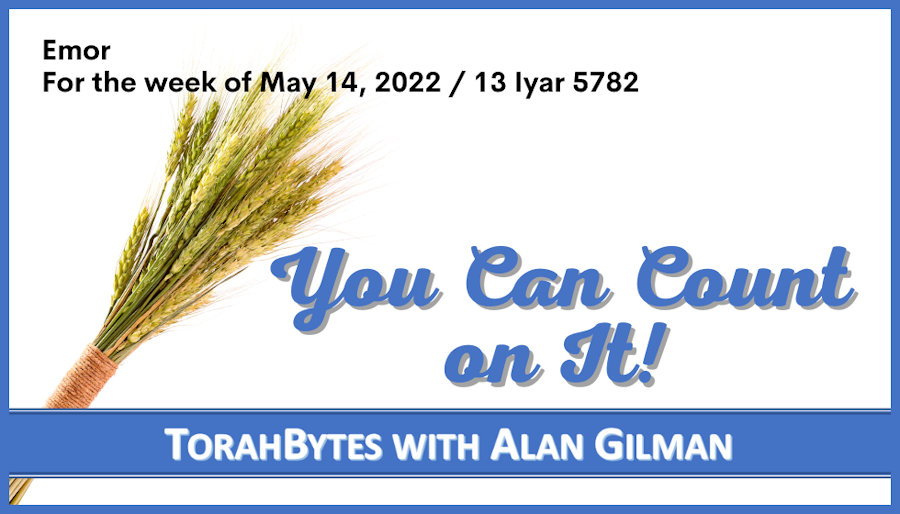For the week of May 14, 2022 / 13 Iyar 5782

Emor
Torah: Vayikra/Leviticus 21:1 – 24:23
Haftarah: Ezekiel 44:15-31
Download Audio [Right click link to download]
You shall count seven full weeks from the day after the Sabbath, from the day that you brought the sheaf of the wave offering. You shall count fifty days to the day after the seventh Sabbath. Then you shall present a grain offering of new grain to the LORD. (Vayikra/Leviticus 23:15-16)
This week’s parsha (weekly Torah portion) includes the most complete description of the feasts of Israel in the Bible: Shabbat (the weekly sabbath); Pesach (Passover); Shavuot (Pentecost or Weeks); Yom Truah (the day of blowing [of the shofar], which traditionally marks the new year); Yom Kippur (the Day of Atonement); and Sukkot (Booths or Tabernacles). Note that biblically speaking, Pesach actually refers only to the first evening, while the seven days following is the Feast of Matzah (Unleavened Bread). Eventually the term Pesach came to refer to the week-long feast.
Also included is a ritual that starts at Pesach time and continues until Shavuot. There is some controversy over which day this ritual was to begin. The Torah says, “on the day after the Sabbath,” but the first day of Pesach is to be observed as a sabbath, whatever day of the week it lands. So, it isn’t clear whether the ritual was to begin the second day of Pesach (the majority view) or the day after the first weekly Shabbat after the first day of Pesach. Sorry if that’s confusing. Regardless, what is clear is that at Pesach time an offering of the first fruits of the harvest was to be waved before the Lord and then the people were to start counting days. They were to count fifty days from the waving of the sheaf. The fiftieth day was the next festival, Shavuot (which is why it is also called Pentecost, derived from the number fifty). The Hebrew word for sheaf is “omer.” The counting of the fifty days between Pesach and Shavuot is called “Sefirat HaOmer”, the Counting of the Omer. From what’s written in Torah, it is difficult to determine whether God intended a literal counting of the days, but that is the custom. Each day a blessing is recited, and the day is counted.
That the days are counted might be behind how the New Covenant book of Acts refers to Shavuot in chapter two and verse one. To denote the arrival of the day, the Greek word, “symplay-ro-oh” is used, which has the sense of fulfilment or filling up. That is why some older translations, read, “When the day of Pentecost had fully come” instead of simply writing “arrived” as became more common in later translations. All Torah feasts have an element of anticipation, but the Counting of the Omer, takes it to another level.
But there is more than anticipation going on here. There is a unique, purposeful connection between the two feasts of Pesach and Shavuot. You might remember that when God directed Moses to tell Pharoah to let the people of Israel go, he said that it was so that the people would serve God at Mt. Sinai (see Shemot/Exodus 3:12). It was about fifty days between Israel’s deliverance from Egypt and their receiving the Torah from God on that very mountain. Pesach commemorates the deliverance; Shavuot the receiving of the Torah. One leads to the others. Neither are standalone events.
God rescued the people from slavery in order that they would become “a kingdom of priests and a holy nation” (Shemot/Exodus 10:6). While the experience of liberation is something to celebrate, it is essential to remember that it was a liberation unto a mission. The people weren’t set free so that they could finally do whatever they wanted. They were set free from serving the oppressive, self-seeking tyrant in order to serve the life-giving, loving Creator.
Those who have experienced the greater liberation from bondage to sin and death under the oppressive rule of the evil one also need to remember a similar connection. We too haven’t been set free just so that we can do whatever we want. As we read in the New Covenant Writings, like ancient Israel, all followers of Israel’s Messiah have been called to be “a chosen race, a royal priesthood, a holy nation, a people for his own possession, that you may proclaim the excellencies of him who called you out of darkness into his marvelous light” (1 Peter 2:9).
Sometimes, we can feel as if our lives are without purpose or direction. This can be the case even for those who have experienced the liberating power of God through the Messiah. Let’s remember, however, that becoming God’s children through faith in Yeshua is only the beginning. How our purpose is to be lived out may not always be clear, but God’s got a plan for us. You can count on it.
Scriptures taken from the English Standard Version